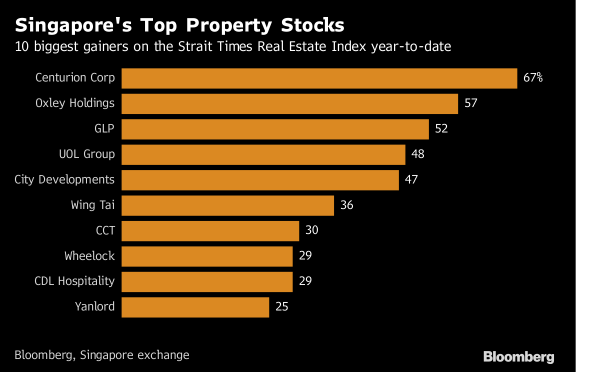(Source: Bloomberg)
Singapore developers may extend their share rally into 2018 on a reviving home market, according to money managers and analysts, who say the central bank’s warning on a potential oversupply may not play out for years.
After double-digit gains this year, Morgan Stanley sees a 42% jump in shares of CapitaLand Ltd., the nation’s largest developer, and a 24% increase in City Developments Ltd., the second-biggest, in the next 12 months. Property companies such as City Developments and UOL Group Ltd. are among the top performers in Singapore in 2017, with developers collectively on track for their best annual performance in five years.

Source: Bloomberg
Signs of a revival in Singapore’s property market include record prices paid for land deals, the first increase in home prices in four years, and the first gain in office rents in 2 and a half years. The buoyant sentiment was tempered last week by the Monetary Authority of Singapore (MAS), which flagged the risk of rising vacancies amid slowing population growth.
The risk of housing oversupply may not be imminent because of the lead time needed to complete property projects. With the government only recently starting to increase the supply of land, the resulting developments won’t hit the market before 2020, said Raj Vaswani, a director of the Tolaram family office in Singapore, which manages $500 million. The firm owns shares in Singapore-listed developers Guocoland Ltd., Frasers Centrepoint Ltd., and CapitaLand.
Not everyone is bullish on Singapore’s housing market. Nicholas Teo, trading strategist at KGI Securities (Singapore) Pte, said many factors will weigh on a sustainable rally in home prices, including rising vacancy rates, weakness in rental demand and the prospect of rising global interest rates. In addition, Singapore still has some stringent home-purchase restrictions in place that limit the possibility of runaway home prices.

Still, an “up cycle” for property may last into 2020, according to Morgan Stanley, which estimates that home prices will climb as much as 8 percent next year. Wilson Ng, a property analyst at Morgan Stanley, said developers’ valuations are attractive based on discounts to net asset value and price-to-book ratios.





